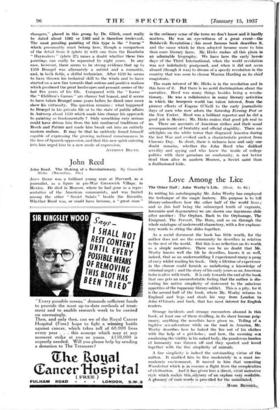John Reed
&nix HERD was a brilliant young man at. Harvard, as a journalist, as a figure in pre-War Greenwich Village, in Mexico. He died in Moscow, where he had gone as a repre-
sentative of the American communists, and was buried among the other " Soviet Saints " beside the Kremlin. Whether Reed was, or could have become, a " great man "
in the ordinary sense of the term we don't know and it hardly matters. Ho wais an eye-witness of a great event—the Bolshevik Revolution ',his, most famous book describes it, and the cause which he then adopted became more to him than mere literary fame. Mr. Hicks makes all this plain in an admirable biography. We have here the early heroic clays of the Third International, when the world' revolution was not indefinitely postponed, and when it did not seem absurd (though it was) to dream of a speedy revolution in the country that was soon to choose Warren Harding as its chief magistrate.
The main interest of Mr. Hicks is in the revolution and in this hero of it. But there is no acrid doctrinairism about the narrative. Reed was many things besides being a revolu- tionary. He was a collaborator in many literary activities in which the bourgeois world has taken interest, from the pioneer efforts of Eugene O'Neill to the early journalistic days of men who now adorn the Saturday Evening Post or the New Yorker. Reed was a brilliant reporter and he did a good job in Mexico ; Mr. Hicks makes that good job real to us. There are accounts of American strikes and thek usual accompaniment of brutality and official stupidity. There are sidelights on the white terror that disgraced America during the last War and evoked such a characteristic protest from Clarence Day. In short, there is richness here and only one doubt remains, whether the John Reed who disliked servility and spying and who knew the inside- of. college politics with their premium on conformity, is not better dead than alive in modern Moscow, a Soviet saint than a disillusioned Gide.










































 Previous page
Previous page